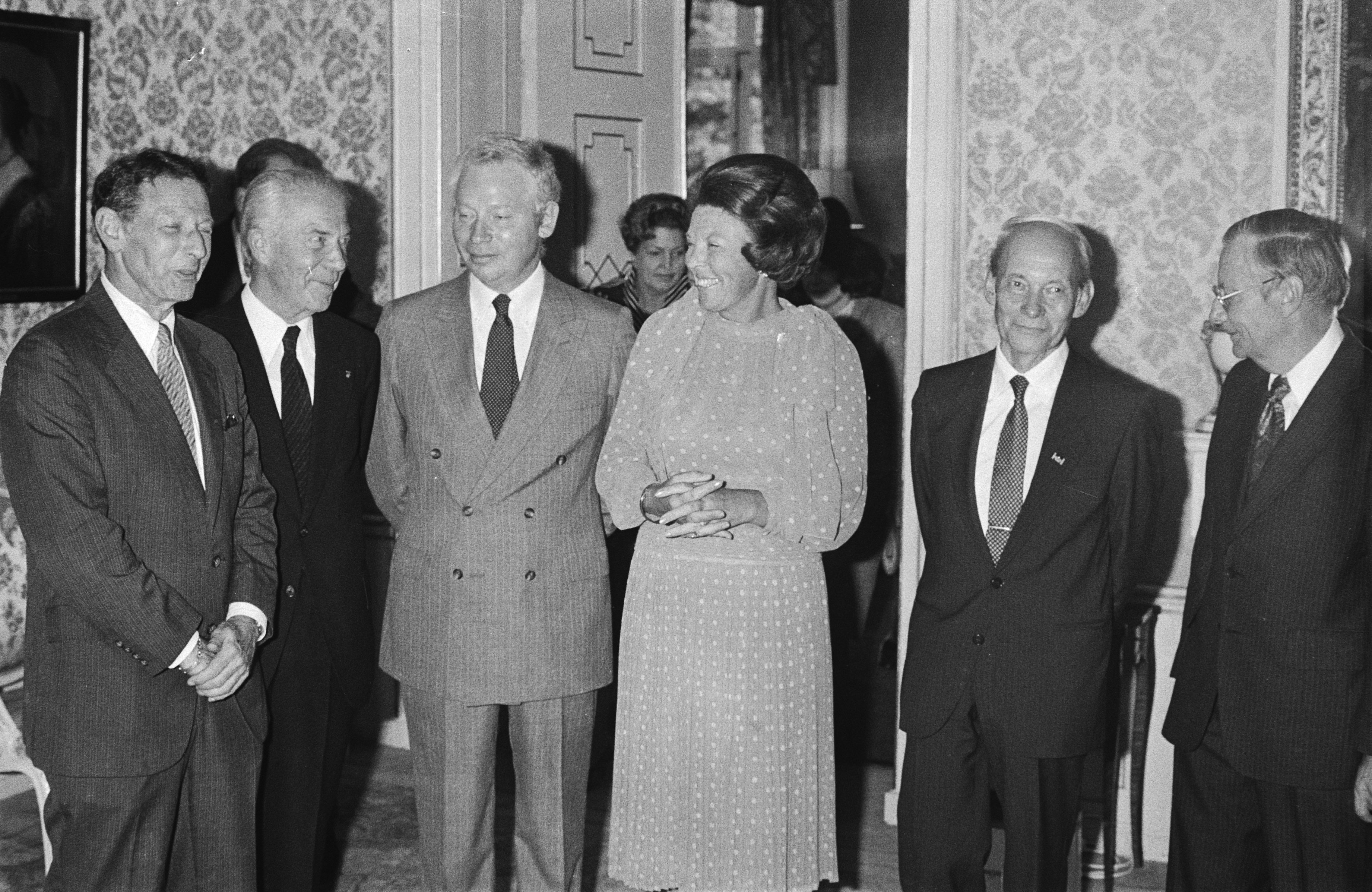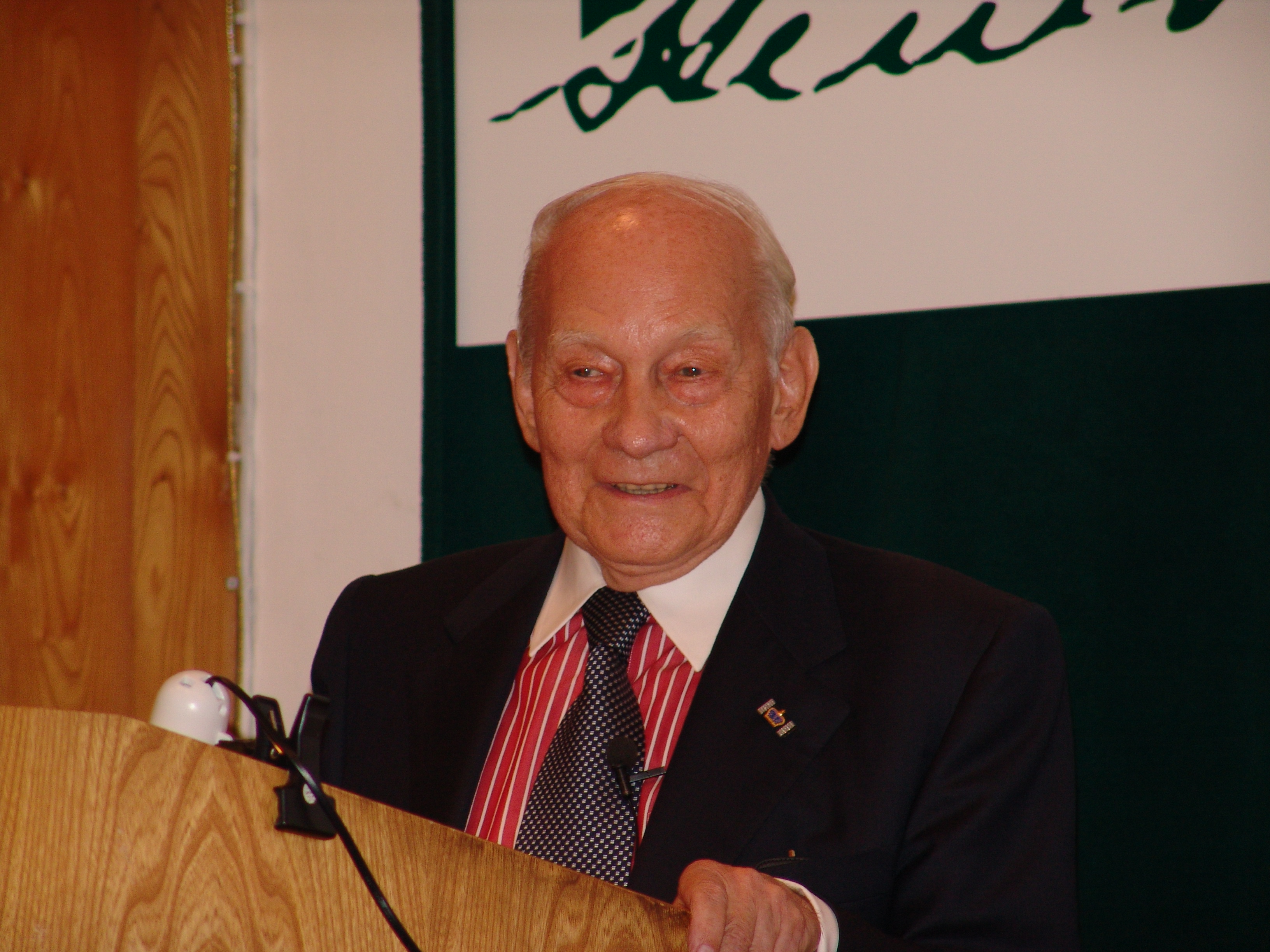1. Early Life and Education
Manfred Eigen's early life was shaped by his family's cultural background and the turbulent years of World War II, which interrupted his formal education and led him to a challenging path toward higher learning.
1.1. Childhood and Youth
Manfred Eigen was born on May 9, 1927, in Bochum, Germany. His parents were Ernst and Hedwig (Feld) Eigen, and his mother was a talented chamber musician. From a young age, Eigen developed a profound passion for music, particularly the piano, which he diligently studied. However, his education was dramatically interrupted by World War II. At the age of fifteen, he was conscripted into service in a German anti-aircraft unit. Toward the end of the war, he was captured by American forces. He later recounted that escaping was relatively easy, and after his escape, he embarked on a journey of hundreds of miles on foot across defeated Germany, eventually arriving in Göttingen in 1945.
1.2. Higher Education and Doctoral Studies
Upon his arrival in Göttingen in 1945, Eigen faced a challenge as he lacked the necessary documentation for university acceptance. Despite this, he demonstrated his profound knowledge in an examination and was successfully admitted to the university's first postwar class. His initial desire was to study physics, but due to the priority given to returning soldiers who had been previously enrolled, he instead enrolled in geophysics. He completed his undergraduate degree and subsequently began his graduate studies in natural sciences. During this period, he had the notable opportunity to be advised by Werner Heisenberg, the renowned proponent of the uncertainty principle. Manfred Eigen ultimately received his doctorate in 1951 from the University of Göttingen, where he completed his studies under the supervision of Arnold Eucken.
2. Scientific Career and Major Achievements
Manfred Eigen's scientific career was marked by groundbreaking research in fast chemical reactions, theoretical contributions to the origin of life, significant leadership roles in scientific institutions, and pioneering efforts in biotechnology.
2.1. Research on Fast Chemical Reactions and Nobel Prize
Manfred Eigen's early research focused on developing methods to measure and analyze ultra-fast chemical reactions, a field that was previously inaccessible to scientific investigation. In 1964, he presented the groundbreaking results of his work at a meeting of the Faraday Society in London. His findings demonstrated for the first time the feasibility of determining the rates of chemical reactions that occur within time intervals as brief as a nanosecond. This pioneering achievement revolutionized the understanding of chemical kinetics. In recognition of these significant contributions, Eigen was awarded the 1967 Nobel Prize in Chemistry. He shared the prize with Ronald George Wreyford Norrish and George Porter for their independent studies on the kinetics of extremely fast chemical reactions, particularly those induced by very short pulses of energy, using relaxation methods. His research not only solved major problems in physical chemistry but also greatly advanced the understanding of complex chemical processes that take place within living organisms.
2.2. Theories on Self-Organization and Origin of Life
Beyond his experimental work, Manfred Eigen made profound theoretical contributions to the understanding of self-organization and the origin of life. His name is closely associated with several key concepts in this field, including the theory of quasispecies, the error threshold, error catastrophe, and Eigen's paradox. A particularly influential contribution was the development of the chemical hypercycle theory, which he elaborated with his colleague Peter Schuster in a series of papers published in 1977 and 1978. This theory proposes the cyclic linkage of reaction cycles, specifically the mutual interaction between proteins and nucleic acids, as a fundamental explanation for the self-organization of prebiotic systems-the complex molecular arrangements that precede the emergence of life. By 1979, this theoretical framework was further adapted to explain the foundational principles governing the origin of life itself.
2.3. Leadership and Institutional Activities
Manfred Eigen held numerous significant leadership positions and was affiliated with various influential scientific and cultural organizations. In 1953, he began his tenure at the Max Planck Institute for Physical Chemistry in Göttingen. His leadership capabilities were soon recognized, leading to his appointment as director of the institute in 1964. Under his directorship, the institute merged with the Max Planck Institute for Spectroscopy, forming the Max Planck Institute for Biophysical Chemistry. He served as an honorary professor at the Braunschweig University of Technology starting in 1965 and later at the University of Göttingen from 1971. From 1982 to 1993, Eigen served as the president of the German National Merit Foundation (Studienstiftung des deutschen VolkesGerman), an organization dedicated to promoting the education of gifted students. He was also a founding member of the World Cultural Council in 1981, highlighting his commitment to fostering global intellectual exchange. Furthermore, Eigen was a member of the Board of Sponsors of The Bulletin of the Atomic Scientists, an organization concerned with global security issues stemming from scientific and technological advances. Notably, despite being an avowed atheist, he was also a distinguished member of the Pontifical Academy of Sciences, demonstrating a commitment to open intellectual discourse across diverse perspectives.
2.4. Entrepreneurial Activities
Manfred Eigen extended his scientific influence into the commercial sector by founding two pioneering biotechnology companies: Evotec and Direvo. These ventures aimed to translate his fundamental research into practical applications, particularly in the field of evolutionary biotechnology. In 1993, he collaborated with Swedish researcher Rudolf Rigler and the German optical systems company Carl Zeiss to develop a mass-producible Fluorescence Correlation Spectrometer (FCS). This technological advancement significantly contributed to the understanding and manipulation of biological systems at a molecular level. His foresight and efforts in this area were widely lauded for establishing a new scientific and technological discipline: evolutionary biotechnology.
3. Major Works and Publications
Manfred Eigen authored and co-authored several influential books and numerous scientific papers that shaped the fields of physical chemistry, molecular biology, and theoretical biology.
Some of his most notable publications include:
- "Selforganization of matter and the evolution of biological macromolecules." Die Naturwissenschaften, Vol. 58, No. 10, pp. 465-523 (1971). This paper was an influential theoretical work on the biochemistry of the origin of life.
- The Hypercycle: A principle of natural self-organization, co-authored with Peter Schuster, published by Springer in 1979 (ISBN 0-387-09293-5). This book detailed their groundbreaking theory on the cyclic linkage of reaction cycles as a mechanism for self-organization in prebiotic systems.
- The Laws of the Game: How The Principles of Nature Govern Chance, co-authored with Ruthild Winkler, published by Princeton University Press in 1983 and again in 1993 (ISBN 0-691-02566-5). This work explored the role of natural laws in governing chance and order.
- From Strange Simplicity to Complex Familiarity: A Treatise on Matter, Information, Life and Thought, published by Oxford University Press in 2013 (ISBN 978-0-19-857021-9). This comprehensive treatise reflected on the interconnectedness of fundamental concepts in physics, information theory, and biology.
- University Ideals, a collection of lectures from the Heidelberg University's 600th-anniversary celebration, co-authored with prominent figures such as Jürgen Habermas, published by Tamagawa University Press (ISBN 4472094517).
4. Personal Life
Manfred Eigen's personal life included two marriages and a publicly known stance on religious belief. He was first married to Elfriede Müller, and together they had two children, a son and a daughter. Later in his life, he married Ruthild Winkler-Oswatitsch, who was also a long-term scientific collaborator and partner. Eigen was openly an atheist, a philosophical position that he maintained even while being a member of the Pontifical Academy of Sciences.
5. Death
Manfred Eigen passed away on February 6, 2019, at the age of 91. He died in Göttingen, Germany, the city where he spent a significant portion of his life and career, including his work at the Max Planck Institute.
6. Honors and Awards
Manfred Eigen received numerous prestigious awards, academic memberships, and honorary doctorates throughout his distinguished career, recognizing his profound contributions to science.
6.1. Major Awards and Academic Memberships
Eigen's significant awards and academic memberships include:
- Otto Hahn Prize (1962)
- Burke Prize (1962)
- Elected member of the American Academy of Arts and Sciences (1964)
- Elected member of the United States National Academy of Sciences (1966)
- Linus Pauling Award (1967)
- Paracelsus Medal (1967)
- Nobel Prize in Chemistry (1967), shared with Ronald George Wreyford Norrish and George Porter
- Elected member of the American Philosophical Society (1968)
- Elected a Foreign Member of the Royal Society (ForMemRS) (1973)
- Pour le Mérite (1973)
- Member of the Soviet Academy of Sciences (now the Russian Academy of Sciences) (1976)
- Faraday Lectureship Prize from the Royal Society of Chemistry (1977)
- Lower Saxony State Prize for Science (1980)
- Austrian Decoration for Science and Art
- Paul Ehrlich and Ludwig Darmstaedter Prize (1992)
- Helmholtz Medal from the Berlin-Brandenburg Academy of Sciences and Humanities (1994)
- Max Planck Research Award (1994), jointly with Rudolf Rigler of the Karolinska Institute
- Honorary member of the Ruhr University Bochum (2001)
- Lifetime Achievement Award from the Institute of Human Virology in Baltimore (2005)
- Golden Goethe Medal (2007)
- Wilhelm Exner Medal (2011)

6.2. Honorary Doctorates
Manfred Eigen was recognized with 15 honorary doctorates from universities across the globe, acknowledging his wide-ranging impact on science and education. These include:
- Honorary Professor, Technical University of Braunschweig (1965)
- Harvard University (1966)
- Washington University in St. Louis (1966)
- University of Chicago (1966)
- University of Nottingham (1968)
- Honorary Professor, University of Göttingen (1971)
- Hebrew University of Jerusalem (1973)
- University of Hull (1976)
- University of Bristol (1978)
- University of Debrecen (1982)
- University of Cambridge (1982)
- Technical University of Munich (1983)
- University of Bielefeld (1985)
- Utah State University (1990)
- University of Alicante (1990)
- University of Coimbra, Portugal (2007)
- Honorary Degree, Scripps Institute of Research (2011)

7. Legacy and Evaluation
Manfred Eigen's legacy extends far beyond his Nobel Prize-winning work, encompassing profound contributions to diverse scientific disciplines and a lasting influence on institutional development and public understanding of science.
7.1. Scientific and Societal Impact
Manfred Eigen's research had a long-term and transformative influence on physical chemistry, particularly in the study of chemical kinetics at unprecedented speeds. His theoretical work, especially on quasispecies and the hypercycle, provided crucial frameworks for understanding the self-organization of matter and the origin of life. This research profoundly impacted molecular biology and reshaped the scientific understanding of life's evolution. Beyond his specific scientific findings, Eigen played a significant role in fostering multidisciplinary approaches to science. He actively worked to establish a comprehensive program at the Max Planck Institute dedicated to investigating the fundamental underpinnings of life at the molecular level, recognizing the necessity of integrating diverse scientific perspectives. His entrepreneurial endeavors, through the founding of biotechnology companies like Evotec and Direvo, further cemented his legacy by pioneering the new field of evolutionary biotechnology. This work not only advanced scientific knowledge but also laid groundwork for practical applications in genetic research and drug discovery, demonstrating a commitment to translating scientific breakthroughs into societal benefits. His membership on the Board of Sponsors of The Bulletin of the Atomic Scientists also underscored his engagement with broader societal issues and the responsible use of scientific knowledge, reflecting a concern for global well-being and open public discourse.